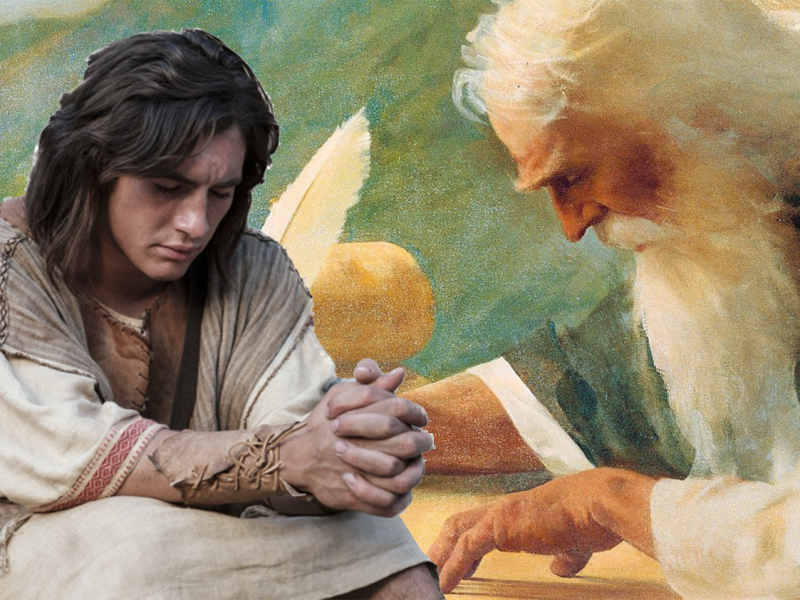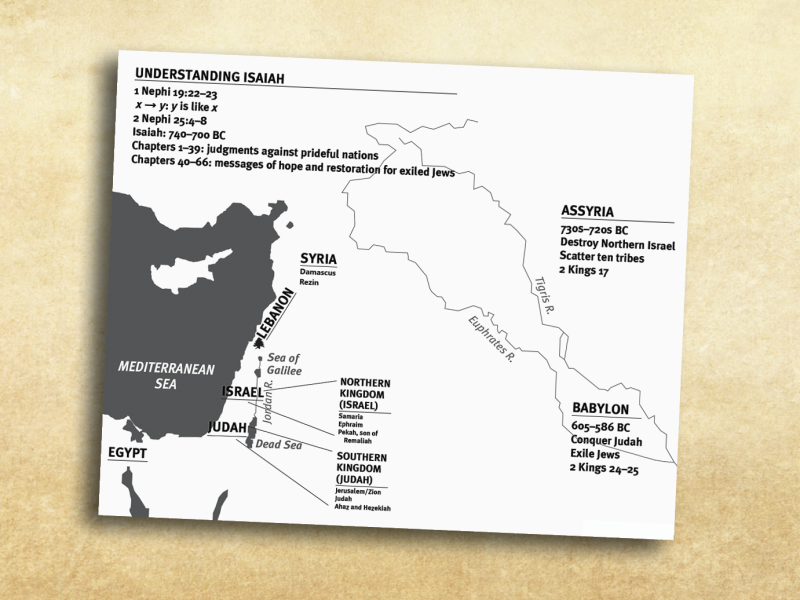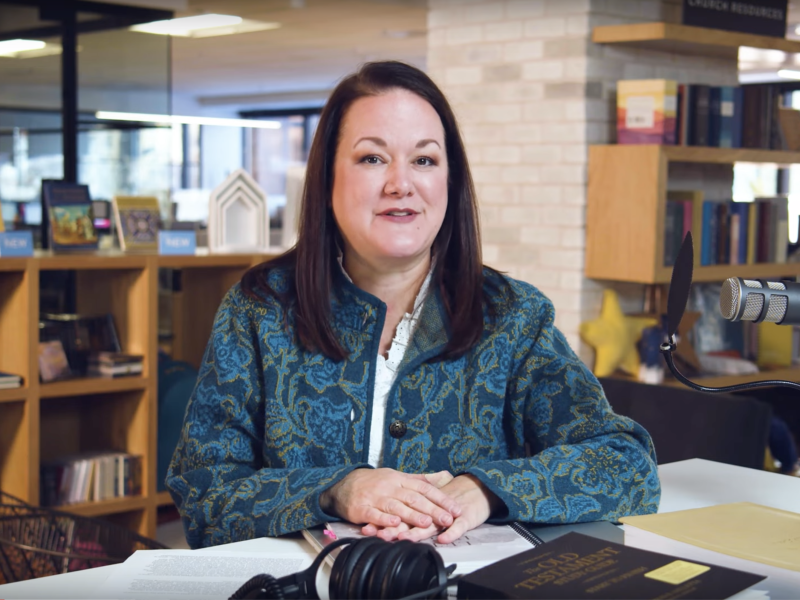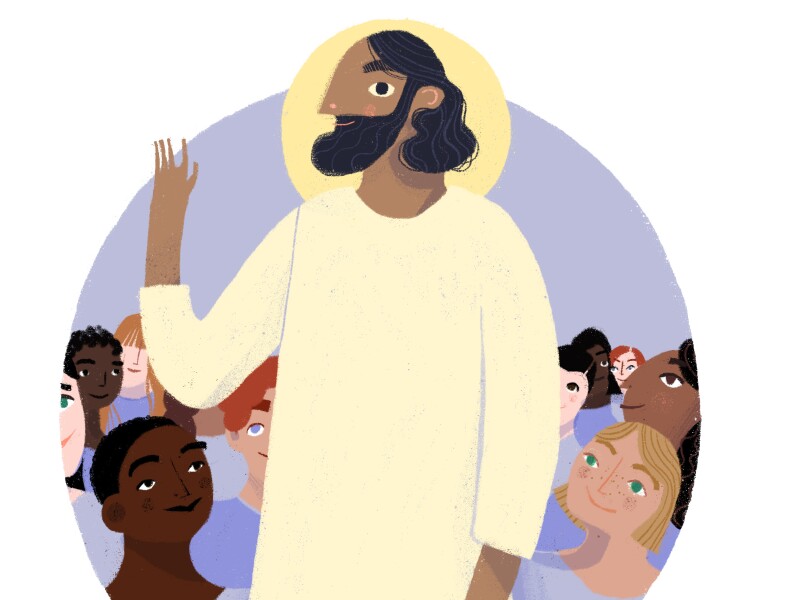These powerful definitions can help shine a new light on the Old Testament.
6 Min Read
“We don’t have to go only to the stories where He appears to someone to find Him—He is in every story.”
2 Min Read
These restored truths clarify Eve’s courageous role in the plan of salvation.
2 Min Read
Get excited for a new year of study with these amazing scriptures.
1 Min Read
The blessings of studying the Old Testament are there, but sometimes they only come through a wrestle.
5 Min Read
“The more we know these prophecies, the more we can step forward with courage and strength and do hard things and help gather Israel.”
1 Min Read
The latest wave of updates to the General Handbook includes an adjustment to a portion about editions and translations of the Holy Bible.
1 Min Read
Shannon Foster knows what it’s like to struggle with scripture study—and she’s found a solution.
3 Min Read
What if faith has nothing to do with hoping God helps us?
2 Min Read
“This may be the most memorable thing we did when my sister returned home from serving her mission.”
2 Min Read
This scripture from the Old Testament reminds us not to rush ahead of God’s timing.
2 Min Read
Here are a few encouraging verses to save for when you need a pick-me-up.
1 Min Read
“I wish I could whisper [this scripture] to every one of God’s girls,” President Freeman wrote.
1 Min Read
This verse is one of the best hidden gems in the Bible.
2 Min Read
There are many mothers in the scriptures with valuable stories—here are just five from the Old Testament that we have a lot to learn from.
7 Min Read
Pelicans, peacocks, and owls? See which birds mentioned in the Bible you’re familiar with and which ones you may have never heard of before.
2 Min Read
Astrology's popularity is on the rise. What does the Church have to say about it?
6 Min Read
This year our Come, Follow Me study concludes with the “minor prophets”—though sometimes obscure, they’re just as full of eternal truths.
6 Min Read
Courses are taught by experts in their fields and range from how to improve your scripture study to overcoming doubts to talking to your kids about tough topics like pornography.
2 Min Read
Opinions and beliefs about the mother of the human race are wide and varied, especially from religion to religion. Here are five insights from Latter-Day Saint leaders that may influence how you think about our glorious Mother Eve.
5 Min Read
“There has never been a better time for us to search—not skim, not skip, not avoid—but really search Isaiah.”
6 Min Read
The Isaiah Map is the tool you never knew you needed—let it help you study and teach this tricky book of scripture.
9 Min Read
In preparing for this week’s Come, Follow Me lesson, I keep accidentally typing “virtual” instead of “virtuous.” Which got me thinking, what would it mean to be a virtually virtuous woman or man?
6 Min Read
When depression and anxiety robbed my ability to feel the Spirit, I learned how to choose to trust God even when I couldn’t feel Him.
6 Min Read
Recognizing the role that poetic tools play in the scriptures deepens our connection to the sacred text.
5 Min Read
You may have been surprised to discover that the calendar lists the book of Psalms for our “Come, Follow Me” study for the next three weeks. Here are some interesting facts you might not have known about this book of scripture.
7 Min Read
Shiphrah and Puah saved him, his mother saved him, and then Miriam, his older sister, is going to save him.
2 Min Read
Maybe you recently sat down to read a chapter of the Old Testament and wondered how on earth it applies to you. But don’t give up—first, you might want to try out this way of approaching your scripture study.
7 Min Read
In the midst of my emotional distress, the story of Elijah and the juniper tree taught me it’s OK to rest.
5 Min Read
"I found some new gems in the story of Ruth and Naomi that have changed my outlook on my own female friendships."
6 Min Read
Hannah’s story represents the feelings of many couples in our own day who suffer similar concerns.
6 Min Read
Both in-person and online, see the iconic works of James Tissot, whose art was feature in Rob Gardner’s ‘Lamb of God.’
1 Min Read
As the story goes, if you looked upon a brass serpent Moses fashioned and placed on a pole, you could be healed. If you didn’t look—well, you died.
3 Min Read
A number of animals—red heifers, lambs, goats, turtledoves, bulls, pigeons, and a bronze serpent—serve as symbols of Jesus Christ’s atonement or sacrifice.
15 Min Read
The children of Israel were well aware that the hand of the Lord was with Moses and He had sanctioned their exodus. Gratefully, the Lord did not leave them comfortless.
4 Min Read
Who wouldn’t want to have a Sunday School lesson on Joseph in Egypt taught by Donny Osmond himself?
1 Min Read
This week’s “Come, Follow Me” story of Joseph in Egypt can teach us how to choose love over fear or anger.
1 Min Read
If you’re looking for a unique depiction of this week’s Come, Follow Me material, check out this new short film produced by Book of Mormon Central and Messages of Christ.
1 Min Read
The God of Abraham, Isaac, and Jacob is also the God of Sarah, Rebekah, and Leah, and the wives of the patriarchs offer powerful examples of righteous living in difficult times.
8 Min Read
Understanding these Hebrew words may bring some unexpected insights into your Old Testament study this year.
1 Min Read
Was the flood really the "baptism" of the earth? And how does the Joseph Smith Translation help us understand the flood?
7 Min Read
It’s encouraging to see that even in the midst of natural disasters, God is always merciful and loving.
5 Min Read
Though Adam and Eve would leave divinity’s immediate presence, in a very tangible way, Christ would leave with them.
9 Min Read
A former full-time seminary and institute teacher, Tammy loves digging into gospel and shared a profound insight on scripture study.
3 Min Read
Want your child to get the most out of this year’s “Come, Follow Me” study? Here are some resources that might help.
2 Min Read
Beauty, majesty, rejoicing, joyful—those are all words that could be used to describe the message we’ll discover within Isaiah 50–57. But as in life, not everything is cheery sunshine: these chapters also invite us to think about rejection and the effects of evil influences. The goal of this week’s lesson is to enlarge our tent and invite everyone to come and learn from the words of Isaiah.
What brings you comfort or peace? If we asked a child that question, their answer might be an ice cream cone or a trip to Disneyland. And while the kid in many of us may find solace in a little ice cream, we’ve likely found deeper sources of comfort; things like a good conversation with someone we trust or a long hug. But the deepest and most lasting peace comes from a knowledge of Christ and His plan. You’ll want to get comfortable for this week’s lesson in Isaiah 40-49, because Isaiah’s words are just what a weary soul needs.
If you've listened to past episodes of this podcast, you've probably heard the phrase "Jesus is coming." That's because we love to talk about the Second Coming and look forward to it with anticipation. Let's be honest, though—the events of the Second Coming, specifically those mentioned in Isaiah 13–35, can be a little frightening. But after today's discussion, you might not find them as scary as you thought. In fact, you might even be excited about that great and important day.
What do you delight in? What really makes you happy? Our goal over the next five weeks is for your answer to be the same as Nephi’s when he said “...that his soul delighteth in the words of Isaiah” (2 Nephi 25:5) And right after that he talked to us saying the words of Isaiah are of great worth and that they are particularly of great worth to those in the last days. Isaiah chapters 1-12 have plenty to delight in and it starts with the message that God is our salvation.
If you’ve ever had a fortune cookie, you know its crispy sweetness is just half the fun—inside these cookies is a fortune on a slip of paper that is said to bring luck and prosperity to the receiver. The verses in this week’s lesson of Proverbs 1–4; 15–16; 22; and 31 as well as Ecclesiastes 1–3 and 11–12, may at first remind you of the messages inside one of these tasty treats. But as we dive deeper into the meaning of these verses, we think you’ll find something much more satisfying than any fortune cookie can offer.
We’ve talked a lot about trusting in the Lord this year. And in this week’s lesson of Psalms 102–103; 110; 116–119; 127–128; 135–139; 146–150, that trust is an important theme. To help us dive deeper into this topic, we invited Chad and Kymberly Wells to talk with us. The Wells' are the parents of Mason Wells, who was severely injured as a missionary in the 2016 Brussels attacks. Their perspective on those harrowing events is anchored in trusting the Lord even through days of great distress and heartache. Their story, along with these chapters in Psalms, will teach us what trust in the Lord can do in our darkest moments.



























































